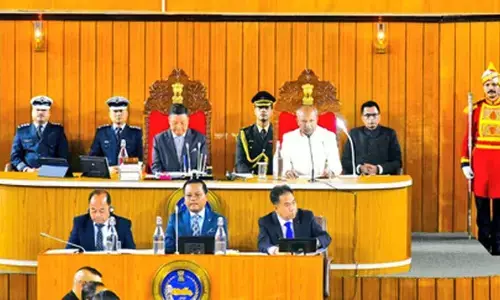Democracy backsliding across the world amid pandemic

Democracy backsliding across the world amid pandemic
Democracy is deteriorating across the world, with countries notably taking undemocratic and unnecessary actions to contain the coronavirus pandemic, an intergovernmental body said in its new report Monday.
Democracy is deteriorating across the world, with countries notably taking undemocratic and unnecessary actions to contain the coronavirus pandemic, an intergovernmental body said in its new report Monday. "Many democratic governments are backsliding," the International Institute for Democracy and Electoral Assistance, or International IDEA, said.
The 34-nation organisation added that as of August 2021, 64 per cent of countries have taken an action to curb the pandemic that it considers "disproportionate, unnecessary or illegal." The Swedish-based body added that the situation is also getting worse in countries that are not democratic.
Autocratic regimes have become "even more brazen in their repression," free speech has been restricted and the rule of law has been weakened, it said. In its flagship report on the state of democracy, International IDEA said the number of backsliding democracies has doubled in the past decade, and mentioned in particular the United States, Hungary, Poland and Slovenia.
"This is the time for democracies to be bold, to innovate and revitalise themselves," International IDEA Secretary-General Kevin Casas-Zamora said in a statement. The report said that "the two years since our last report have not been good for democracy," and the achievement reached when democracy became the predominant form of governance "now hangs in the balance like never before."
"Overall, the number of countries moving in an authoritarian direction in 2020 outnumbered those going in a democratic direction," the report said, adding that in the past two years, the world has lost at least four democracies, "either through flawed elections or military coups." The 80-page report by the intergovernmental organisation whose mission is to advance democracy worldwide, noted "the remarkable strength of civic activism."
It said more than 80 countries have seen protests and civic action during the pandemic despite often-harsh government restrictions. However, pro-democracy movements have met repression in Belarus; Cuba; Eswatini, previously known as Swaziland; Myanmar; and Sudan.
The report comes ahead of US President Joe Biden's December 9-10 virtual "summit for democracy" aimed at gathering government, civil society and private sector leaders in what Biden has cast as a global faceoff against rising autocratic forces. In Asia, International IDEA said, Afghanistan, Hong Kong and Myanmar have suffered from "a wave of growing authoritarianism." But democratic erosion has also been found in India, the Philippines and Sri Lanka. "China's influence, coupled with its own deepening autocratisation, also puts the legitimacy of the democratic model at risk," the report said.
In Africa, democracy declines "have undermined remarkable progress made across the continent over the past three decades." The pandemic has added pressure on governments to respond to concerns regarding governance, rights and social inequality, it said. It also noted military coups in Chad, Guinea, Mali and Sudan.
The report also noted that half the democracies in the Americas have suffered democratic erosion, with notable declines in Bolivia, Brazil, Colombia, El Salvador and the United States. As for Europe, the pandemic "has placed a strain on democracy" and some countries where democratic principles were already under threat, it provided an excuse for governments to weaken democracy further.
Europe's non-democratic governments — it identified Azerbaijan, Belarus, Russia and Turkey — have intensified their already very repressive practices, International IDEA said. "The pandemic broadened the pre-existing rift between high-performing democracies in Western Europe and weaker counterparts in Central and Eastern Europe," said Sam Van Der Staak, head of Program Regional Europe.
"That divide will continue to challenge Europe's unity, as it also faces greater outside pressure from non-democratic superpowers. But its increased democratic isolation also poses opportunities for greater integration and collaboration, as Europe is forced to consider the value of democracy as its core foundational force."











